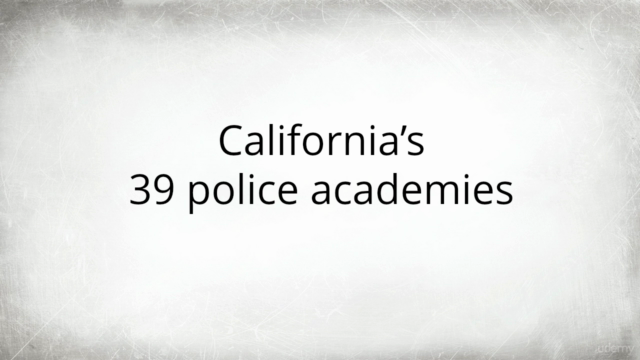StudiGuide 16: Search and Seizure Law in California

Why take this course?
🚔 Master Search & Seizure Law in California with StudiGuide 16!
🚀 Course Overview: This comprehensive online course is tailored specifically for police academy cadets preparing for the California Police Academy (P.O.S.T.) Written Examination. It serves as an invaluable practice review-testing resource, ensuring you have a solid grasp of the search and seizure laws as per the state's Commission on Peace Officer Standard and Training (POST) requirements.
📚 What You Will Learn:
Understanding Constitutional Protections:
- ✅ Fourth Amendment protections and their role in search and seizure law.
- ✅ Standing and Expectation of Privacy: How it affects your investigative actions.
- ✅ Probable Cause: Learn how it links to searching and obtaining evidence.
- ✅ Exclusionary Rule: Understand its implications when collecting evidence.
- ✅ Search Warrants: The process and conditions required to secure one.
- ✅ Knock and Notice Requirements: Ensuring legal compliance when serving a search warrant.
- ✅ The Nexus Rule: Its importance during authorized searches.
- ✅ Plain View Doctrine: When and how it applies to seizures.
- ✅ Warrantless Searches: The conditions under which they are considered legal.
- 🔵 Cursory/Frisk/Pat Search
- 🔵 Consent Searches
- 🔵 Exigent Circumstances
- 🔵 Searches Incident to Arrest
- 🔵 Probation/Parole Searches
- ✅ Motor Vehicle Searches: Understand the specific conditions and circumstances.
- 🔵 Probable Cause Searches
- 🔵 Seizures of Items in Plain View
- 🔵 Protective Searches
- 🔵 Consent Searches
- 🔵 Instrumentality Searches
- ✅ Vehicle Inventory: The legal framework and necessary conditions.
- ✅ Seizing Evidence: Authorities with or without a warrant.
- ✅ Forceful Interactions: Preventing subjects from swallowing evidence.
- ✅ Legal Sampling: Conditions for obtaining blood, fingerprints, and handwriting samples.
Identification Procedures:
- ✅ Reasonable Expectation of Privacy: Understanding its significance.
- ✅ Time Limitations for Search Warrants: Critical information for effective policing.
- ✅ Officer Neutrality: Maintaining a fair and impartial role during identification procedures.
- 🔵 Field Show-Up
- 🔵 Photographic Spread
- 🔵 Custodial Lineup
📝 Why This Course Matters: Selected topics from this course will be integrated into your Mid-Course and End-of-Course Proficiency Tests, ensuring you're fully prepared for the POST examination. A solid grasp of these concepts is crucial for successful law enforcement operations and maintaining the trust of the communities you serve.
🎓 Join StudiGuide 16 Today! Embark on your journey to become a knowledgeable peace officer by mastering search and seizure laws in California. With this course, you'll be equipped with the practical knowledge required to excel in your academy examinations and serve effectively within your community. Enroll now and take the first step towards your future in law enforcement! 👮♂️💫📚
Course Gallery




Loading charts...